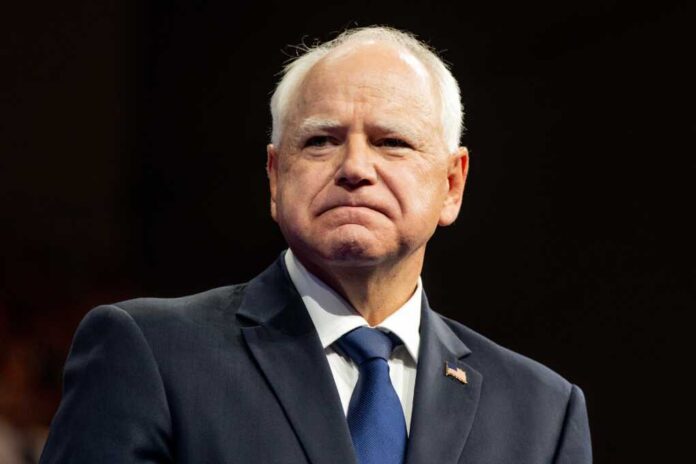
Minnesota Governor Tim Walz ignited bipartisan backlash after likening ICE agents to Nazi secret police during a law school commencement, prompting a fierce DHS rebuke.
At a Glance
- Gov. Tim Walz compared ICE to Hitler’s Gestapo during a University of Minnesota speech.
- DHS condemned the remarks as “absolutely sickening” and potentially dangerous.
- ICE reports a 413% spike in assaults on agents amid heightened political rhetoric.
- Walz’s remarks follow his failed 2024 VP bid and may signal 2028 presidential ambitions.
- Immigration enforcement remains a key focus of the Trump administration’s second term.
Nazi Comparison Sparks National Backlash
Minnesota Governor Tim Walz has drawn national condemnation after comparing U.S. Immigration and Customs Enforcement (ICE) agents to the Nazi Gestapo in a May 17 commencement speech at the University of Minnesota Law School. Referring to Trump-era immigration tactics, Walz criticized reported detentions “in unmarked vans” and alleged violations of due process, describing them as akin to those used by Nazi secret police.
The comments, which many saw as a grotesque exaggeration, were met with immediate outrage. “Absolutely sickening,” the Department of Homeland Security responded in a statement, warning that such rhetoric dishonors federal officers and trivializes Holocaust atrocities.
Watch a report: Governor Walz Under Fire Over ICE Comments.
ICE Assaults Surge as Politics Intensify
DHS officials also pointed to a staggering 413% rise in physical assaults against ICE agents, which they link in part to inflammatory political rhetoric. “When public figures frame our officers as fascists, it endangers lives,” said a senior DHS spokesperson, calling on leaders to lower the temperature.
Walz, who served as Kamala Harris’s 2024 running mate, has been positioning himself for a potential 2028 presidential run. His remarks appear aimed at energizing progressive voters—but risk alienating moderates and independents weary of incendiary comparisons.
Even the Biden-era White House Rapid Response team criticized Walz’s language as counterproductive, signaling cracks within Democratic messaging unity. Critics on both sides of the aisle argue that Walz crossed a moral red line by invoking Holocaust imagery to score political points.
Immigration Politics Head into Overdrive
As the Trump administration prepares to implement its mass deportation strategy—now bolstered by a fresh electoral mandate—the contrast between enforcement-first policies and Walz-style rhetoric has become a flashpoint. Trump has pledged to deport millions of undocumented immigrants, citing voter support for stricter border control.
Amid the policy clash, DHS emphasized that ICE officers are executing the law—not making it—and deserve respect, not vilification. “This kind of speech endangers not just our officers, but democratic discourse itself,” the department stated.
Governor Walz has not apologized, instead doubling down on his critique of Trump’s immigration legacy. But the backlash to his Gestapo comparison may mark a defining moment in his national aspirations—one that tests just how far rhetorical boundaries can stretch in the age of polarized politics.





























